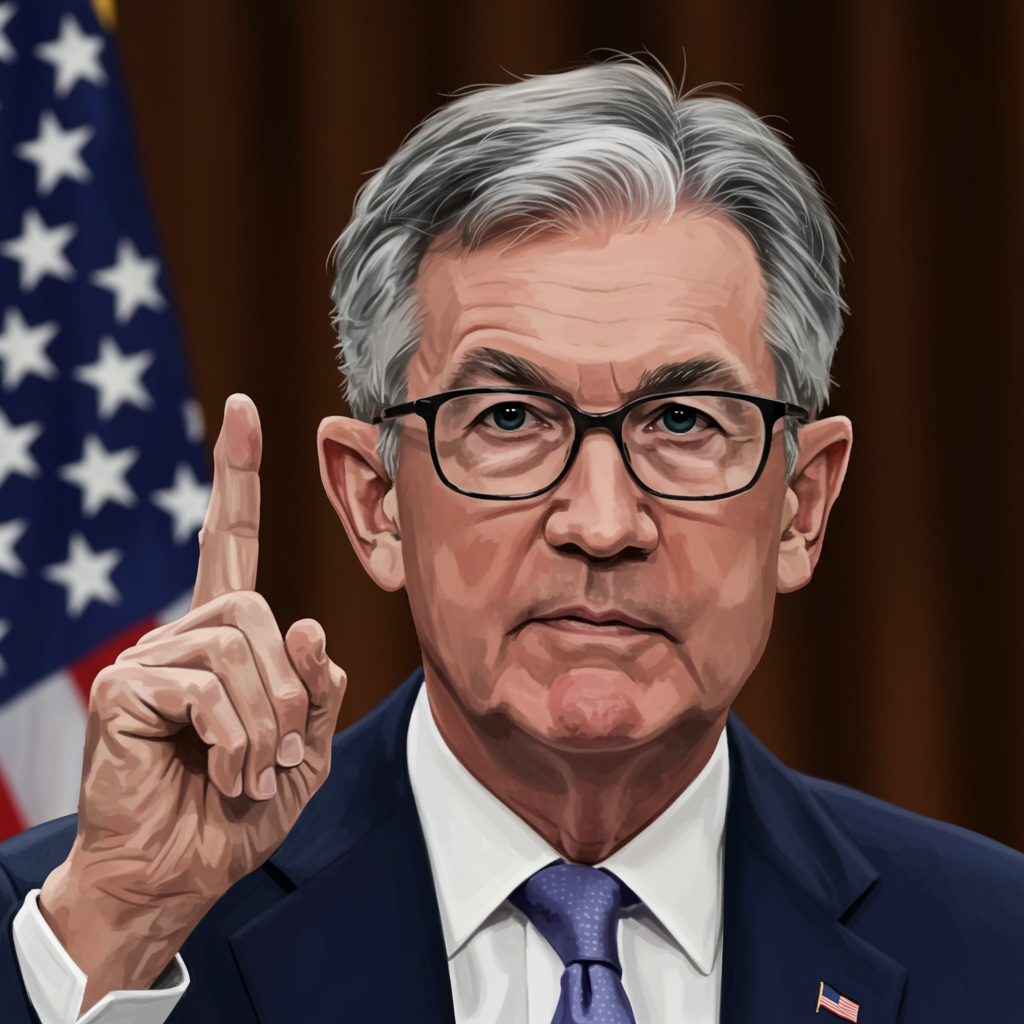The independent stance of the U.S. Federal Reserve is under unprecedented scrutiny, as its chair, Jerome Powell, faces intense political pressure from former President Donald Trump. Despite a relentless, multi-pronged campaign urging his resignation, Powell has signaled to allies and associates a firm resolve to complete his term. This high-stakes standoff is not merely a personal battle for Powell but a pivotal moment for the Federal Reserve’s long-standing independence.
At the heart of the conflict lies a fundamental disagreement over monetary policy. Trump has publicly and privately demanded that the central bank significantly lower interest rates, believing this would further stimulate the economy. Powell, however, has consistently maintained that the Fed’s decisions must be guided solely by economic data and the institution’s dual mandate of maximum employment and price stability, free from political influence.
The Unprecedented Political Pressure Campaign
Donald Trump’s criticism of Jerome Powell has escalated into a public and private pressure campaign unlike any seen before directed at a Fed chair. Trump has repeatedly launched verbal attacks, labeling Powell “terrible,” “stupid,” and “a numbskull.” He has even gone so far as to call Powell “truly one of my worst appointments,” openly expressing a desire for his resignation.
This sustained verbal assault is part of a broader, coordinated effort by the White House and Trump allies. The strategy aims to undermine Powell’s credibility and make his tenure as challenging as possible. This pressure is not just rhetoric; it extends into veiled threats and public scrutiny designed to dislodge him.
Weaponizing the Fed’s Renovation Project
One key tactic employed by the Trump administration and its supporters involves the Federal Reserve’s ongoing $2.5 billion headquarters renovation project. Trump allies have seized upon the project’s hefty price tag, portraying it as an example of mismanagement and wasteful spending. They suggest that cost overruns could even constitute a “fireable offense.” This narrative is strategically designed to increase public pressure on Powell. The argument is that the central bank’s perceived extravagance contrasts sharply with the financial struggles of everyday Americans, which, ironically, could be alleviated by lower interest rates.
During one notable interaction, Trump personally visited the Fed headquarters to tour the construction, with Powell reluctantly escorting him. The former president used the opportunity to publicly advocate for rate cuts, even jovially but pointedly stating, “I’d love you to lower interest rates.” This moment underscored the directness of the political pressure Powell endures.
Defending the Pillars of Central Bank Independence
Despite the relentless attacks, Jerome Powell has conveyed to associates a profound sense of duty. His refusal to resign is deeply rooted in his belief that stepping down would severely undermine the Federal Reserve’s institutional independence. This autonomy, crucial for effective monetary policy, ensures that economic decisions are based on data and long-term stability, not short-term political expediency.
Republican Senator Mike Rounds, who has directly questioned Powell on his intentions, confirmed the chair’s unwavering stance. According to Rounds, Powell “feels very strongly that his responsibility is to maintain that independence.” He explicitly stated that resigning would “reduce the independence of the Federal Reserve.” This steadfastness ensures Powell will remain a target for criticism, particularly as the Fed continues to prioritize data-driven decisions over political demands for immediate rate cuts.
The “Boiling Frog” Strategy and Legal Constraints
The White House’s approach has been likened to the “boiling frog” metaphor: to make Powell’s position so uncomfortable that he eventually quits, rather than directly firing him. Advisers have reportedly warned Trump that outright dismissing Powell could trigger a severe financial market crash and an economic crisis. This caution explains Trump’s public statements that he has no plans to fire Powell, even amid intense criticism.
However, the question of legality surrounding the dismissal of a Fed chair remains. While broadly considered illegal for a president to fire the Fed chair without cause, a Supreme Court ruling concerning independent agency heads has led Trump’s team to believe they’ve identified a “loophole.” The alleged “cause” is linked to the mismanagement of the Fed building renovation, a narrative the White House spokesperson has pushed to justify intervention into the Fed’s “failings” and ensure “taxpayer money is not wasted.”
Market Implications and Expert Perspectives
The ongoing feud between the White House and the Federal Reserve has significant implications for financial markets. Market professionals widely view political interference in central bank policy as detrimental. Premature interest rate cuts driven by political pressure could trigger inflation and erode the central bank’s credibility, ultimately destabilizing markets.
Ed Yardeni of Yardeni Research observed market turbulence, noting a slight decline in the US Dollar Index and a surge in gold prices following mixed signals from a Treasury Secretary. Senator Elizabeth Warren has warned that markets could “crash” if Trump were to prematurely fire Powell. Michael Brown of Pepperstone emphasized that Powell must remain to avoid “surrendering to shameless, bully-boy tactics” and to prevent the undermining of monetary policy independence. This suggests a widespread concern within financial circles about the integrity of the Fed.
Bipartisan Support and Alternative Views
Despite initial criticism from some Democrats during periods of rising interest rates, Powell’s commitment to defending the Fed’s independence has garnered renewed bipartisan support. Former officials like Jared Bernstein, who chaired the Biden-era Council of Economic Advisers, have rallied around him, praising his dedication to protecting the institution’s integrity above personal comfort. Even some Republicans, like Senator Rounds, have subtly encouraged the White House to scale back its attacks, recognizing that political pressure could taint any future rate cuts and make them appear coerced, rather than economically justified.
Interestingly, some prominent economists, including Mohamed El-Erian and Jeremy Siegel, have presented a paradoxical viewpoint. They suggest that a resignation by Powell, under certain circumstances, might actually protect Fed independence, potentially resulting in a “good outcome” of the intense political feud. This perspective highlights the complexity of the situation and the varied opinions on how best to safeguard the central bank’s crucial role.
Focus on Policy, Not Politics
Amidst the political furor, Powell has indicated to associates that his focus remains solely on the Fed’s dual mandate: fostering maximum employment and maintaining price stability. Publicly, he has consistently emphasized the need to stick to economic considerations, shrugging off political implications. Bill English, a Yale professor and former director of the Fed’s monetary affairs division, succinctly captured this sentiment: “The best defense for the Fed is to get the policy right.” He added that Powell’s best course of action is to “hang tough and do the best job he can on monetary policy.”
This commitment to data-driven decision-making, rather than political appeasement, is seen by many as crucial for the Fed’s credibility and, by extension, for broader economic stability. Powell’s determination to serve his full term through May 2026 underscores the profound stakes involved for the future autonomy of the Federal Reserve.
Frequently Asked Questions
Why is Jerome Powell resisting calls for his resignation?
Jerome Powell is steadfastly resisting calls for his resignation because he believes stepping down under political duress would severely undermine the Federal Reserve’s institutional independence. His commitment, reiterated to allies like Senator Mike Rounds, stems from a core conviction that the central bank’s monetary policy decisions must remain free from political interference. This autonomy is crucial for long-term economic stability and for maintaining the Fed’s credibility in financial markets.
What specific pressure tactics has Donald Trump used against the Fed?
Donald Trump has employed a multi-faceted pressure campaign against the Federal Reserve. This includes repeated public verbal attacks, branding Powell with derogatory terms like “terrible” and “numbskull.” The White House has also weaponized the Fed’s $2.5 billion headquarters renovation project, publicly scrutinizing its cost and suggesting it could be grounds for dismissal. This concerted effort aims to create an untenable environment for Powell, pressuring him to resign without a direct, legally risky firing.
How might political pressure on the Federal Reserve impact the U.S. economy?
Political pressure on the Federal Reserve can significantly impact the U.S. economy by eroding confidence in the central bank’s independence. If monetary policy decisions are perceived as being influenced by political motives rather than economic data, it can lead to market instability, increased inflation risks, and a loss of investor trust. Experts warn that a forced resignation or politically motivated interest rate cuts could trigger market crashes and undermine the Fed’s crucial role in maintaining financial stability.
In conclusion, the ongoing saga between Jerome Powell and Donald Trump highlights a critical battle for the integrity of the Federal Reserve. Powell’s unyielding resolve to serve his full term, despite intense pressure, is a testament to his belief in the central bank’s indispensable role in maintaining economic stability through independent, data-driven monetary policy. This struggle underscores the vital importance of an autonomous central bank, a cornerstone of a healthy, stable economy, and its implications resonate far beyond Washington D.C., impacting global financial markets and the daily lives of Americans.



